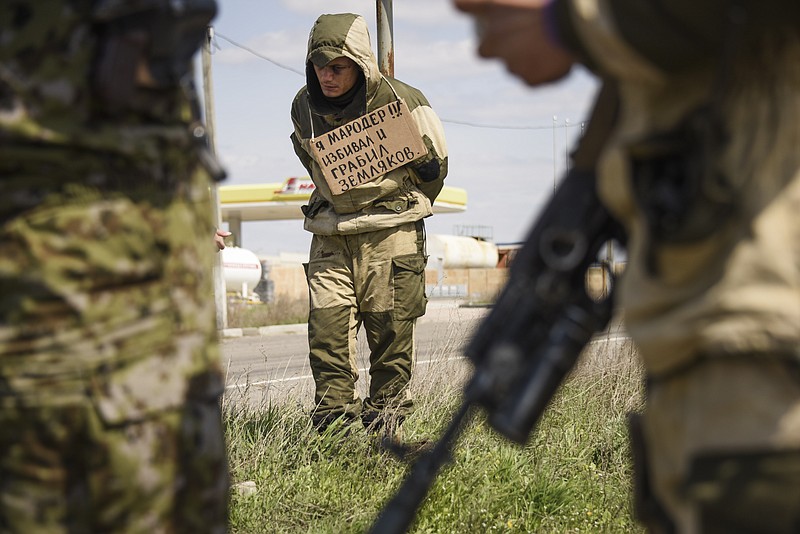KRASNYI PARTYZAN, Ukraine (AP) - A bruised rebel fighter in battle fatigues is tied to a traffic pole, avoiding glances as a crude message hung about his neck flutters in the wind: "I am a marauder. I beat up and robbed my countrymen."
The man's captors were not his foes, but fellow separatist fighters in eastern Ukraine.
In the maelstrom of conflict, summary justice has become commonplace in rebel-controlled areas, and it targets civilians and combatants alike.
Rebel unit commander Alexander Nazarchenko stood a few paces away from the humiliated fighter in the town of Krasnyi Partyzan. He said he consulted with superiors before taking such a drastic measure. The man's offenses, he explained, were particularly outrageous.
"He assaulted a civilian, stole his car, took cash from his relatives," Nazarchenko said. "He said he was borrowing the money, but that isn't exactly how you borrow money."
The victim reported the fighter to rebel authorities, who sentenced him to trench-digging duties - the standard punishment among the rebel militia. Undeterred, the fighter got drunk and stole back the car from the same victim.
His chin dug into his chest and hands pinned back with plastic cable, the man admitted to a reporter that he committed the crimes - and groaned for a cigarette. His eye was swollen and cheeks puffed up with bruises; blood had dried on his split lip.
These types of incidents are fruit of the chaos - judicial, bureaucratic and economic - that has prevailed in eastern Ukraine throughout the conflict.
Andrei Pasichnik, deputy head of police in Luhansk, the second largest separatist-held city, condemned the arbitrary justice. But he conceded that much work remained to get a proper justice system in rebel areas.
When officials loyal to the central government in Kiev were forced out last year, they appear to have taken much of the cash and resources with them.
Pasichnik said efforts are now focused on installing police departments in areas under nominal Luhansk rebel control. There are no judges, so sentences are directly passed down by prosecutors.
Things are slightly better in the neighboring Donetsk region, where rebels have fashioned a would-be breakaway state dubbed the Donetsk People's Republic.
In early April, the head of the top rebel court, Eduard Yakubovsky, said tribunals had only resumed administering civil, family and criminal cases three months earlier. The separatist justice system is modeled on the old Soviet one, albeit on a far smaller scale than earlier as money is short.
"Before, in the territory of the Donetsk region, there were 55 local courts ... employing 3,262 people. That's the size of a full-fledged mechanized infantry unit," Yakubovsky said at a press conference. "The number of judges has now been reduced fourfold."
That has provided fertile ground for kangaroo courts, particularly in areas under control of Cossack commanders. Cossacks are members of a semi-military group that traditionally guarded the far-flung outposts of the Russian empire.
Pasichnik said that anybody taking the law into their own hands and administering punishments such as whipping or even executions would face criminal charges.
"Vigilante justice? No. Only the law-enforcement system has the right to that," Pasichnik said. "The Cossacks ... did cooperate with us before, of course, but there were certain individuals that tried to create their mini-states."
That was a veiled reference to Cossack commanders like Nikolai Kozitsyn, a Russian national who ruled over the town of Perevalsk in defiance of Ukrainian and rebel authorities alike.
In an interview with The Associated Press in November, Kozitsyn explained that he believed capital punishment was a necessary deterrent to crime in unruly times.
"It has had a positive effect," he told AP. "We have no marauding, no burglaries or car-jacking."
Kozitsyn has since been squeezed out and is currently thought to be back in Russia. But there are still holdouts.
In Stakhanov, a town of 120,000 people, Cossacks are still in charge. A Cossack commander who gave only his nom de guerre, Borsch, explained how he dealt with drunks.
"We caught one drunk and jailed him for three days. We gave him five lashes," he said. "We then made him drink two cups of sunflower oil, and let him out at night and let him run back home."
